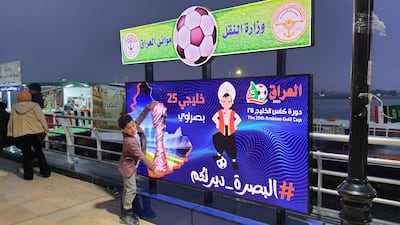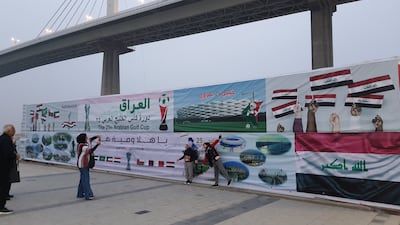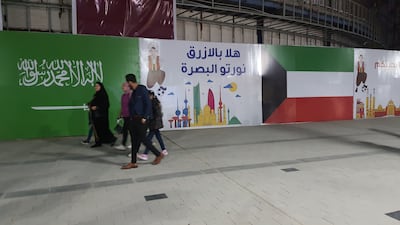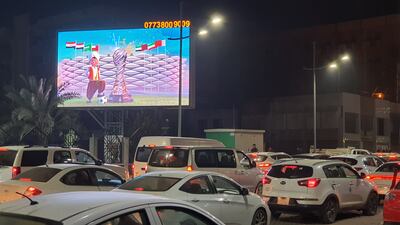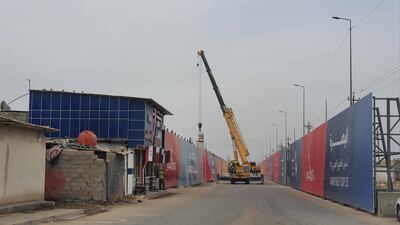Basra Corniche is abuzz with Iraqis enjoying evenings lit up by fireworks and traditional music, just days before football's Arabian Gulf Cup comes to town.
Fans sail in wooden boats on the Shatt Al Arab waterway, the confluence of the Tigris and Euphrates rivers on which the southern port of Basra stands. Flags of the Gulf states decorate the vessels, from which songs welcoming teams blare.
The Gulf Cup is returning to Iraq on Friday, for the first time since 1979.
In the four decades or so that followed, the country has endured war and diplomatic isolation, then political and security instability after the 2003 US-led invasion that toppled Saddam Hussein.
Iraq will be joined by the UAE, Saudi Arabia, Kuwait, Bahrain, Oman, Qatar and Yemen in the 25th Gulf Cup, which will run from January 6 to 19 in Basra.
For Iraqis, hosting the biennial event — first held in Bahrain in 1970 — will turn a new page in the troubled history of their country, boost relations with Gulf neighbours and represent a crucial move towards recovery.
“It is an indescribable feeling, we are so thrilled to have the tournament here in Basra and to host our dear brothers from the Gulf states after all these years,” Mustafa Mohammed, 30, tells The National.
Mr Mohammed strolls along the Corniche with his son Ibrahim, 6, who asks his father to snap pictures of him next to the flags and signs of welcome.
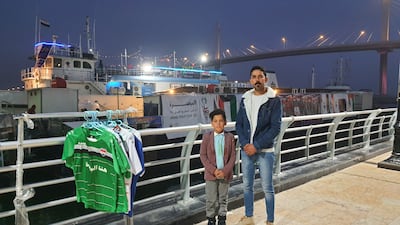
“Football has the power to bring people together and having the tournament here means a lot, not only for Basra but for all Iraq,” Mr Mohammed says.
“It will change the picture of Iraq from an unsecure land with killing in every corner to a stable country with peaceful people”.
“The event will help opening up Iraq to tourists and investment.”
However, he admits that “it still needs a few more years for full recovery”.
Former champions
When the tournament was staged in Baghdad in 1979, the hosts were crowned champions. Iraq also won in 1984 and 1988.
Following the 1990 invasion of Kuwait that led to severing ties between Baghdad and other Gulf states, the Iraqi team was banned from taking part in the competition.
It returned in 2004, a year after Saddam Hussein was removed from power.
After 2010, Iraq pushed for hosting the event, but the fragile security situation in many parts of the country, political upheaval and a lack of sports infrastructure discouraged the Arab Gulf Cup Football Federation.
To meet requirements, Iraq over the past few years has built modern sports facilities and hotels.
It constructed the Basra International Stadium with a capacity of 65,000. It is also called the Trunk of the Palm because its design is inspired by the palm trees for which Basra is famed.
It also built Al Minaa Olympic Stadium, which can accommodate 30,000 spectators. New five-star hotels have sprung up in the city.
Festive mood
A few days ahead of the competition, the city is in a festive mood with preparations in full swing.
Workers apply fresh paint to the pavements and plant flowers and trees. Bulldozers remove rubbish and debris from main streets.
The flags of the Gulf States hang from electricity poles and tall buildings. Billboards welcoming the teams and their fans dot the city, next to posters of militiamen killed in the fight against ISIS between 2014 and 2017.
“Welcome Gulf people!” reads one banner on the main road linking Basra International Airport to the city.
“Basra is your home,” says another, next to the mascot for the tournament, Sinbad the Sailor — one of the region’s legendary characters.
With hotels fully booked, tribal chieftains have offered their mudhifs — public halls where tribes mainly welcome guests and settle community affairs — to host the Gulf fans.
Volunteers have launched a website for residents who want to host visitors. Fans can also apply if they need a place to stay.
Iraq has even waived visa fees and tariffs on cars for Gulf fans.
“I’m confident the championship will be the most successful one,” Basra Governor Asaad Al Eidani told state TV on Monday.
“The post-championship Iraq will be different from the pre-championship one.
“It is a step forward to retain Iraq’s normal position in the fields of sport, culture and social. It is a message to the whole world that we are capable.”
Missed opportunities
Despite its oil wealth — about 70 per cent of Iraq’s proven reserves of 153.1 billion barrels are found in Basra province — the city is plagued by broken infrastructure, poverty and violence.
Piles of rubbish are strewn on dusty streets where donkeys, stray dogs, sheep and goats roam. Rivers running through the city are filled with sewage and rubbish.
Armed tribal disputes often break out inside Basra itself and its outskirts. In August, clashes between Shiite militias erupted, amid months-long political wrangling to form the country's government.
Informal settlements can be found near the stadiums and main streets, as well as in the city's outskirts.
Authorities are erecting metal screens and wooden panels so these are hidden from visitors.
“It's as if we are expecting guests at home, but we can’t clean it, so we put a carpet to cover the dirt,” says taxi driver Aziz Mohammed, laughing as he dodges potholes.
Like some Basrawis, Mr Mohammed says the tournament is not a priority.
“They should have spent these funds on improving public services and find solutions for those living in slums, instead,” he says.
